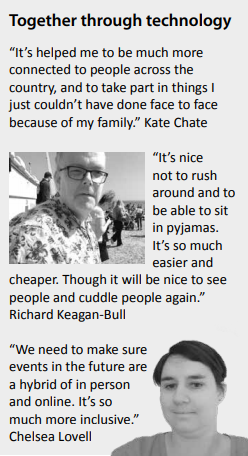 Perhaps the single biggest change for us during Covid has been the move to online. At the beginning of the pandemic, everyone said they had never used Zoom or Teams, and several people did not own a smartphone, tablet or computer. The how-to, easy-read guides on technology that members created and Learning Disability England (LDE) shared during those early days proved to be very valuable. Despite initial worries, everyone has embraced this new digital world. As Pat Charlesworth commented: “I don’t know what I would have done without Zoom – I’d have gone mad.”
Perhaps the single biggest change for us during Covid has been the move to online. At the beginning of the pandemic, everyone said they had never used Zoom or Teams, and several people did not own a smartphone, tablet or computer. The how-to, easy-read guides on technology that members created and Learning Disability England (LDE) shared during those early days proved to be very valuable. Despite initial worries, everyone has embraced this new digital world. As Pat Charlesworth commented: “I don’t know what I would have done without Zoom – I’d have gone mad.”
Self-advocacy and grassroots organisations quickly set up activities ranging from dance classes, quizzes and craft groups to meetings and support networks. One example was the Creating Connections project between SeeAbility and LDE. Others were My Life My Choice’s Phone Buddies and Computer Buddies and their online festival – Ben McCay oversaw much of that work. Everyone agreed that digital was now an important part of their lives and would continue after Covid (see box).
Vulnerable and ‘other’
The group talked about how the “vulnerable” description used about people with learning disabilities during the pandemic made them feel. Yes, lots of us had to shield,” said Chelsea Lovell. “But that doesn’t mean we weren’t contributing to our community. Why weren’t those stories being told?” Charlesworth added: “It’s as though the media and politicians were determined to see us as different. To portray us as more needy than everyone else. Everyone is vulnerable in some way. This determination to make us ‘other’ is very dangerous. It blocks inclusion.”
The group talked about the different ways they had contributed through the pandemic. This included organising groups such as a film club and art classes, a campaign to persuade local NHS managers to prioritise people with learning disabilities for vaccination, rolling out mental health training and advising on identifying local needs and reasonable adjustments around vaccination, including supporting people terrified of needles.
Accessible information in one place
Accessible information on the everchanging lockdown rules was vital and was not being produced by government. LDE self-advocates led the creation of many resources in partnership with Photo Symbols, Books Beyond Words (pictured is an image from a booklet on coronavirus vaccination), Mencap and others. Within the first few weeks of the pandemic, LDE had developed an open access Coronavirus Hub to share them.
This also included work by NWTDT Pathways and their Signalong sessions, and Lewisham People First’s weekly music sessions. As LDE has often observed, people who don’t use speech to communicate can be left out. We hope lessons have been learnt by government departments as, ultimately, they have a statutory duty to make sure information is accessible to everyone.
The right to stay alive
LDE joined voices with over 70 other disabled people’s organisations and allies early in the pandemic in an open letter supporting a statement about the rights of disabled people during Covid 19. Members were all concerned about media coverage and letters from GPs about do not attempt resuscitation (DNAR) notices. LDE ran a significant DNAR campaign and joined forces with Turning Point to develop a DNAR toolkit for people with learning disabilities and the people who support them.
The LDE representative body co-chairs said at the time: “Decisions on people’s treatment being made based on them having a learning disability are never OK – even one is too many. “We are pleased to hear there are examples of people and their supporters being positively involved but we want to see all lives valued and people not fearful of others writing them off.” LDE worked in partnership with the British Institute for Human Rights to run a number of workshops, which led to two BIHR reports.
We need action now to stop DNARs being used wrongly once and for all. That’s why we are working with the BIHR to do a human rights analysis of the experiences of people with learning disabilities, their families and paid supporters. A Learning Disabilities Mortality Review (LeDeR) report and policy, Learning from Lives and Deaths, was published in March 2021. The way forward includes ensuring changes are made to the system – outcomes have been set to reduce avoidable death and to include individuals and families – which is reassuring. It feels like a positive step in the right direction.
Links to the initiatives highlighted in this article are included in our online issue




